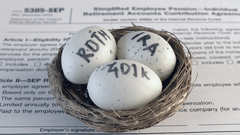
Sudden money can feel like a gift—and, in many ways, it is. Whether the funds arrive through an inheritance, a legal settlement, a business sale, or another unexpected event, the moment can change your life in ways you didn’t plan for. What many people don’t realize right away is that it also comes with a long list of financial questions, decisions, and consequences.
Read More

Losing someone close to you is never easy. The grief comes in waves, often when you least expect it. And just when you're trying to navigate those emotions, you're handed a pile of paperwork and deadlines—many of them involving taxes. Few people are prepared for that moment, yet it’s one most families will eventually face. Knowing what to expect can make this difficult chapter a little less overwhelming.
Who Takes Care of the Tax Matters?
Read More

A new home comes with excitement, hope—and often, a lot of paperwork. While most buyers focus on curb appeal, location, and loan approvals, few think to consult their CPA before signing a contract. That can be a costly mistake. Your CPA doesn’t just file your taxes—they understand how a major purchase like a home can affect your financial picture for years. Before you commit, there are some questions your CPA hopes you’ll ask.
How Will This Home Affect My Tax Situation?
Read More

Summer is usually considered to be a time for fun and relaxation. For those who are lucky enough to get the summer months off, it can also be a time to add to job skills, credentials or even the household coffers. For that, a summer job can’t be beat. Whether it’s a casual part-time job for your child or a foray into a new field where you can test the waters for a possible career change, summer jobs are full of potential
Why Summer Jobs Matter
Read More

Throughout history, there have been times when the economy has gotten so bad that we dipped into a recession. A recession isn’t as bad as a depression. Even younger generations will have heard of The Great Depression, thanks in part to shows like The Waltons, and stories passed down from grandparents. A recession isn’t considered as bad as a depression, but it can be bad enough that people can lose their savings, their homes and even their dignity. History repeats itself and we’re bound to have a recession sooner or later. What can you do to prepare for it?
Read More

People talk about saving money like it’s a piece of cake. And for a lot of people—mainly those with a lot of disposable income—it is easy to stockpile cash. But for the rest of us with very little disposable income, or who struggle more with finances, saving is a challenge. But it does need to be a priority, because life is full of unpredictable situations where savings can be a lifesaver.
Read More

Few things create as much anxiety among taxpayers as the possibility of an IRS audit. However, the reality of audits is often far less alarming than you might assume. While it is important to file accurate returns and follow tax laws, the likelihood of an audit is lower than most people think, and those who take a proactive approach to tax compliance have little to fear.
Understanding how IRS audits work, why they happen, and how to minimize audit risk can provide peace of mind and help taxpayers stay prepared in the rare event that an audit occurs.
Read More

Self-employment offers flexibility, independence and the potential for unlimited earnings, but it also comes with important financial responsibilities—one of the most significant being taxes, as your CPA can attest to. Unlike traditional employees who have taxes withheld from their paychecks, self-employed individuals must handle their own tax obligations, including making estimated tax payments throughout the year. Failing to do so can lead to underpayment penalties, interest charges, and financial stress when tax season arrives.
Read More

Every business owner aims to maximize profits, yet many overlook hidden expenses that quietly drain resources. These costs may seem insignificant, but over time, they add up, reducing profitability and restricting growth. Identifying and eliminating these unnecessary expenditures can improve cash flow and create a more financially stable company. Below are key areas where businesses commonly lose money and practical strategies to cut these hidden expenses today.
1. Unused Subscriptions and Software
Read More

Managing payroll is one of the most important responsibilities for business owners. Ensuring employees are paid correctly and on time is essential not only for maintaining morale and compliance but also for avoiding payroll tax issues that could lead to audits, penalties, or even legal trouble. The IRS and state tax agencies pay close attention to payroll taxes, and mistakes—whether intentional or accidental—can trigger red flags that invite unwanted scrutiny.
The Importance of Payroll Compliance
Read More

With the ways things are going with the economy, more people are looking to be their own boss with an e-commerce business. E-commerce has been around since the internet first became available to the public, which is over 20 years now. If you’re ready to hit the ground running and want to be successful using an e-commerce business model, here are some expert tips to keep in mind.
Keeping Your Website Optimized for Conversions
Read More

Online funding management systems have made it popular and convenient for entrepreneurs to ask for and collect startup funds from family and friends. Hundreds of now successful young businesses got their early boost from benevolent relatives and friends. Whether startups choose to use sites like Kickstarter and GoFundMe, or whether owners approach family and friends in person, it’s become commonplace and even acceptable to solicit friends and families for money to bootstrap a business.
Read More

Paying for college is one of the biggest financial challenges families face. Tuition costs just keep going up, making it increasingly important to plan ahead and explore all the different funding options. Fortunately, there are multiple ways to cover these expenses without putting an overwhelming strain on your finances. By combining different strategies, you can very likely find a manageable way to support your child’s education. Just remember that the earlier you start this preparation, the better—and easier—it will be.
Read More

Spring cleaning isn’t just for your home—it’s also a great opportunity to tidy up your financial records. Whether you’re an a person who’s just looking to take a more organized approach to managing your own personal finances or you’re a business person charged with tracking financial records, maintaining organized records can help you prepare for tax season, identify financial opportunities and reduce the anxiety of not knowing what’s going on, money-wise. Here are some essential tips to help you declutter, organize and optimize your financial records.
Read More

Life insurance is a critical component of financial planning, providing a safety net for loved ones in case of an unexpected loss. While purchasing a policy is an essential first step, it’s equally important to review your life insurance periodically. Life is dynamic and, as circumstances change, your coverage needs will naturally evolve.
Major Life Events
During a person’s lifetime, there will be major life events that warrant another look at life insurance policies. These include:
Marriage or Divorce
Read More

As a responsible head of the family, you’re likely always on the lookout for ways to secure your family’s financial security. Estate planning is the foundation of endeavors such as this. By putting into place instruments like wills, trusts and other plans, you have the power to help ensure the stability and financial resources of your loved ones a long time after you’re no longer able to manage these things yourself.
Read More

Running a business often means taking calculated risks, including extending credit to customers or offering loans to other businesses. While this can foster growth, it also comes with the possibility of nonpayment. When debts become uncollectible, they are classified as bad debts. Fortunately, the IRS provides some relief by allowing businesses to deduct certain bad debts from taxable income. Understanding the requirements and processes for these deductions is essential for compliance and to minimize tax liabilities.
Defining Bad Business Debt
Read More

When it comes to small business ownership, retirement planning often takes a backseat to the daily grind of running the business. Between managing employees, overseeing operations, and focusing on growth, thinking about retirement might not seem urgent. However, the earlier retirement savings options are set up, the better it is for both business owners and their employees. Fortunately, there are a variety of retirement savings options that can be customized to fit the needs of a small business.
401(k) Plans
Read More

One of the best New Year’s gifts you can give yourself is to get out of debt in 2025. It’s totally possible to achieve in a year’s time for many people. Here are some tips to help you spend less and pay down your debt faster.
Curtail Spending
Read More

Did you know it’s possible to make your vacation time tax deductible? But before you drag down the suitcases from the attic and pack the family SUV, you should know the legalities of doing this to comply with the IRS. Never do anything that’s against the law, and if you have any questions or confusion about any deductions, consult with your CPA. Here are some tips for making vacation time tax deductible—legally.
Bring Family to Conventions
Read More

One of the responsibilities that business owners have is to ensure compliance with tax laws. Thankfully, your CPA helps with this complex task, but there are some aspects of being a business owner that must be decided as an owner. One of those is compensation. While your CPA can help to guide you, you must determine how much to pay yourself and your employees. More importantly, determining reasonable compensation isn’t only an internal decision; it’s a crucial component of legal compliance.
Read More

Understanding the differences between an independent contractor and an employee is essential for both businesses and its workers. This classification affects not only the nature of the working relationship but also legal rights, tax obligations and benefits entitlement. Misclassification can lead to unnecessary financial and legal repercussions.
Defining the Two Kinds of Roles
Read More

Running a business involves a delicate balance of ambition, strategy, and financial management. While success stories often take center stage, the reality is that many businesses face financial challenges that can spiral into bankruptcy if left unchecked. By understanding the most common causes of business bankruptcy, business owners can recognize the warning signs early and take steps to safeguard their company’s future.
Insufficient Cash Flow
Read More

Before you start lamenting your empty wallet, take a moment to consider this: you might be sitting on hidden cash without even realizing it. That’s right—your household or business could be a treasure trove of untapped resources just waiting to be discovered.
Check the Couch Cushions—Literally and Figuratively
Read More

Have you ever gone to the store for a carton of milk and come home with a new air fryer, a potted plant, and a throw pillow you didn’t even need? If so, welcome to the club! Impulsive spending has an uncanny way of sneaking into our lives, charming us with shiny objects and limited-time sales. But while it can feel thrilling in the moment, it often comes with regret—or worse—a credit card statement that makes your jaw drop.
Why Do People Spend Impulsively?
Read More

Running a home business isn’t without its own unique challenges. For all the conveniences that operating a business out of your home brings, there are some pitfalls that all small business owners have in common should strive to avoid. Ironically, the same admirable inclinations that gave you the tools to start and run your home business may be the very ones that prove to be your downfall. One crucial yet often overlooked resource is the expertise of a Certified Public Accountant (CPA). Could this professional be the missing link that elevates your home business to the next level?
Read More

Being married brings many advantages besides having someone to help fold the laundry or comfort you when you’re having a rough day. Tax benefits are another benefit, although people don’t get married to save on taxes, thankfully. But in the U.S., if you do happen to be married, you should know that there are a great number of tax benefits to be had. Your CPA can tell you all about it during your next appointment. In the meantime, here’s a closer look at the tax advantages of marriage and how they can benefit couples at various stages of life.
Filing Jointly vs. Filing Separately
Read More

Preparing taxes isn’t most people’s idea of a good time. Usually, tax time is considered something of a downer, especially for anyone trying to do their own taxes. If you make the sound choice to hire a CPA, the entire process can be a lot easier, though. Here are more strategies, tools, and practices that can make tax preparation simpler and more efficient, helping you to avoid common mistakes and reduce the burden associated with tax season.
Understanding Your Tax Obligations
Read More

Failing to file your taxes for several years can feel overwhelming. Whether you missed deadlines due to life circumstances, a misunderstanding of tax obligations, inability to pay your tax liability or simply procrastination, you may be worried about the consequences of not filing. You should be, because the IRS takes a dim view of tax evasion for any reason. But there’s good news, too. You don’t have to flee the country or look over your shoulder for the rest of your life. It’s always possible to resolve the issue and get back on track.
Read More